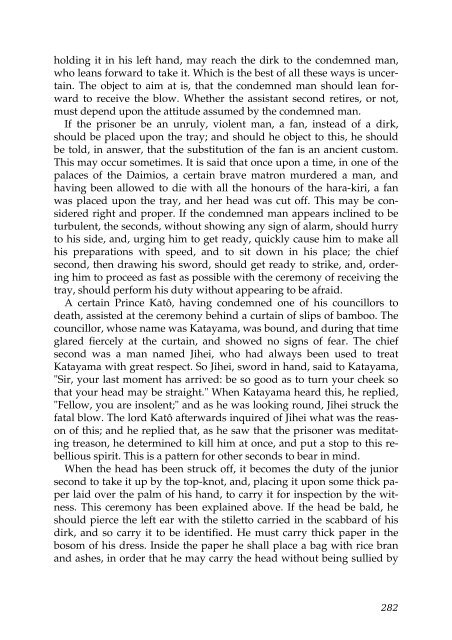You also want an ePaper? Increase the reach of your titles
YUMPU automatically turns print PDFs into web optimized ePapers that Google loves.
holding it in his left hand, may reach the dirk to the condemned man,<br />
who leans forward to take it. Which is the best <strong>of</strong> all these ways is uncertain.<br />
The object to aim at is, that the condemned man should lean forward<br />
to receive the blow. Whether the assistant second retires, or not,<br />
must depend upon the attitude assumed by the condemned man.<br />
If the prisoner be an unruly, violent man, a fan, instead <strong>of</strong> a dirk,<br />
should be placed upon the tray; and should he object to this, he should<br />
be told, in answer, that the substitution <strong>of</strong> the fan is an ancient custom.<br />
This may occur sometimes. <strong>It</strong> is said that once upon a time, in one <strong>of</strong> the<br />
palaces <strong>of</strong> the Daimios, a certain brave matron murdered a man, and<br />
having been allowed to die with all the honours <strong>of</strong> the hara-kiri, a fan<br />
was placed upon the tray, and her head was cut <strong>of</strong>f. This may be considered<br />
right and proper. If the condemned man appears inclined to be<br />
turbulent, the seconds, without showing any sign <strong>of</strong> alarm, should hurry<br />
to his side, and, urging him to get ready, quickly cause him to make all<br />
his preparations with speed, and to sit down in his place; the chief<br />
second, then drawing his sword, should get ready to strike, and, ordering<br />
him to proceed as fast as possible with the ceremony <strong>of</strong> receiving the<br />
tray, should perform his duty without appearing to be afraid.<br />
A certain Prince Katô, having condemned one <strong>of</strong> his councillors to<br />
death, assisted at the ceremony behind a curtain <strong>of</strong> slips <strong>of</strong> bamboo. The<br />
councillor, whose name was Katayama, was bound, and during that time<br />
glared fiercely at the curtain, and showed no signs <strong>of</strong> fear. The chief<br />
second was a man named Jihei, who had always been used to treat<br />
Katayama with great respect. So Jihei, sword in hand, said to Katayama,<br />
"Sir, your last moment has arrived: be so good as to turn your cheek so<br />
that your head may be straight." When Katayama heard this, he replied,<br />
"Fellow, you are insolent;" and as he was looking round, Jihei struck the<br />
fatal blow. The lord Katô afterwards inquired <strong>of</strong> Jihei what was the reason<br />
<strong>of</strong> this; and he replied that, as he saw that the prisoner was meditating<br />
treason, he determined to kill him at once, and put a stop to this rebellious<br />
spirit. This is a pattern for other seconds to bear in mind.<br />
When the head has been struck <strong>of</strong>f, it becomes the duty <strong>of</strong> the junior<br />
second to take it up by the top-knot, and, placing it upon some thick paper<br />
laid over the palm <strong>of</strong> his hand, to carry it for inspection by the witness.<br />
This ceremony has been explained above. If the head be bald, he<br />
should pierce the left ear with the stiletto carried in the scabbard <strong>of</strong> his<br />
dirk, and so carry it to be identified. He must carry thick paper in the<br />
bosom <strong>of</strong> his dress. Inside the paper he shall place a bag with rice bran<br />
and ashes, in order that he may carry the head without being sullied by<br />
282



